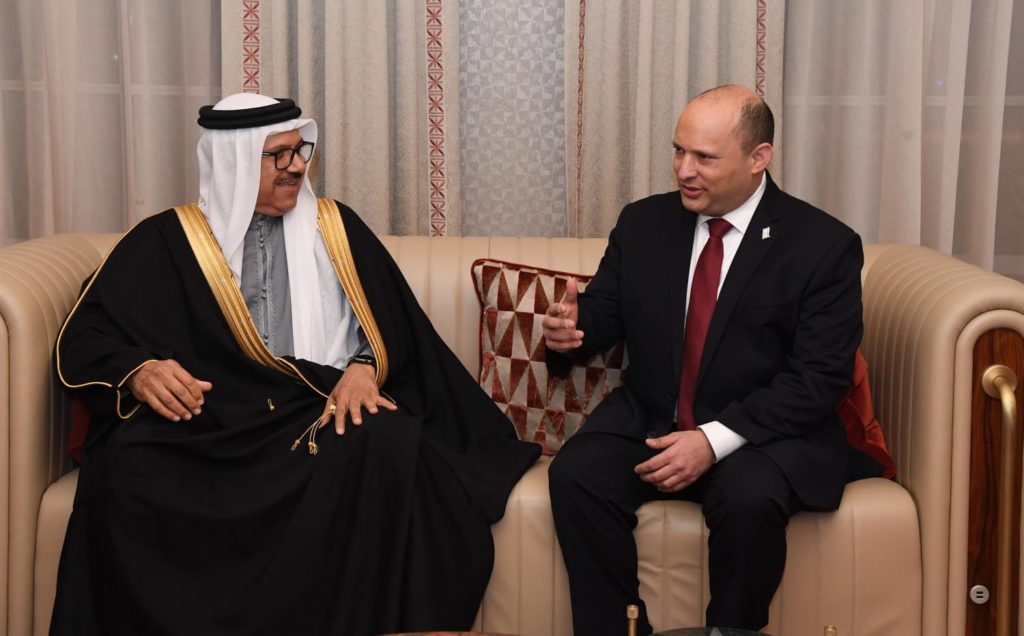
Israeli Prime Minister Naftali Bennett on Monday made a historic trip to Bahrain, where he was set to meet with Crown Prince and Prime Minister Salman bin Hamad al-Khalifa. And even though Bennett didn’t mention Iran in his remarks when departing—Tehran and its nuclear program loomed in the background.
Before setting off on the first-ever official visit by an Israeli Prime Minister to Bahrain, Bennett hinted at the ever-present Iranian threat. “I think that in this tumultuous period, it is doubly important that from our region should come a message of cooperation, goodwill, standing together in the face of threats and building bridges to peace,” Bennett said in Hebrew in comments translated and published by his office.
The visit by Bennett, in which he will also meet with Bahraini King Hamad bin Isa Al Khalifa, comes just one day after Bennett met in Israel with visiting United States Senator Lindsey Graham. During his conversation, Bennett and the US lawmaker “discussed the Iranian threat, which is faced by both Israel and the US, and ways to deal with it,” according to a press release from Bennett’s office. Per the summary of the meeting, they “also discussed the security challenges in the Middle East and ways to strengthen bilateral cooperation.”
Given the current events, Iran talks aren’t surprising. The major world powers and Iran appear to be entering the final stage in their nuclear negotiations—or at least running out of time before Iran makes enough progress toward nuclear weapons as to make the deliberation thus far irrelevant.
The sides are trying to resuscitate the collapsed Joint Comprehensive Plan of Action (JCPOA) nuclear accord that the US left in 2018. Since then, Iran has been withdrawing from their own obligations in the JCPOA, ultimately making more progress towards weapons-grade nuclear fuel than ever before.
Bahrain, like Israel, would be deeply threatened by a nuclear Iran—and is nonetheless put at risk by Iran’s nefarious meddling in the region that would only be emboldened by a mediocre nuclear accord that boosts Iran’s economy with sanctions relief. Bahrain is also home to a major US naval base in the region and was one of the signers of the Abraham Accords peace agreement with Israel in 2020.
Yet while Iran is likely a topic to be discussed between Bennett and his Bahraini counterpart, it was downplayed in the visit’s plans as stated by Bennett’s office. As in, Iran wasn’t mentioned explicitly at all.
Per a separate Israeli press release on the trip, Bennett the Crown Prince “will discuss additional ways to strengthen bilateral ties. Additionally, the Prime Minister and the Crown Prince will also discuss the importance of peace, advancement and prosperity in the region, and especially the advancement of diplomatic and economic issues, with an emphasis on technology and innovation.”
It was unclear why the press statements and Bennett’s own comments did not mention Iran directly, although it may be an attempt to keep the talks secret either from Iran or from creating an excuse for public outcry. Bahrain, despite being a Western ally, has a sizable population of adherents to Shiite Islam, the religious beliefs also held by the regime that rules Iran.
According to the Israeli press release, Bennett and the Crown Prince first met at the United Nations’ Climate Change Conference (COP26) last November in Glasgow, Scotland. During that meeting, the Crown Prince invited Bennett to visit.
Per Bennett’s comments before he left to fulfill that offer on Monday, as translated from Hebrew by his office, the historic visit is a “moving event… the goal of which is to provide content and energy for the peace between the two countries.”
And while it wasn’t mentioned, keeping the peace in the region by jointly facing down Iran is likely on the agenda as well.
(By Joshua Spurlock, www.themideastupdate.com, February 14, 2022)
